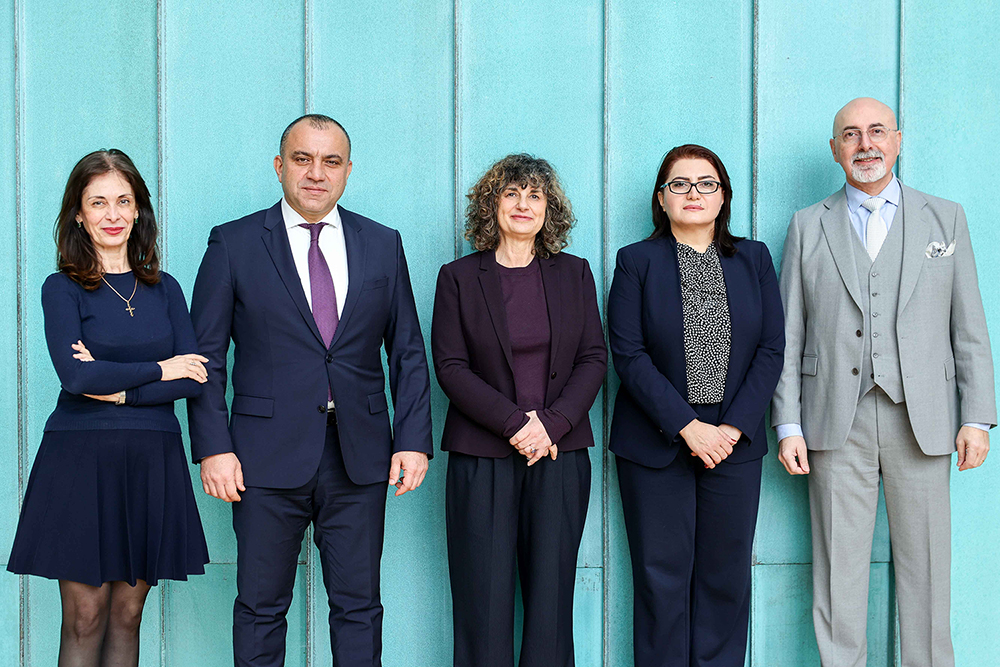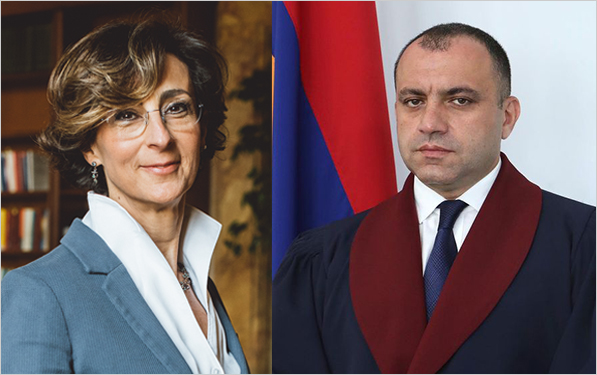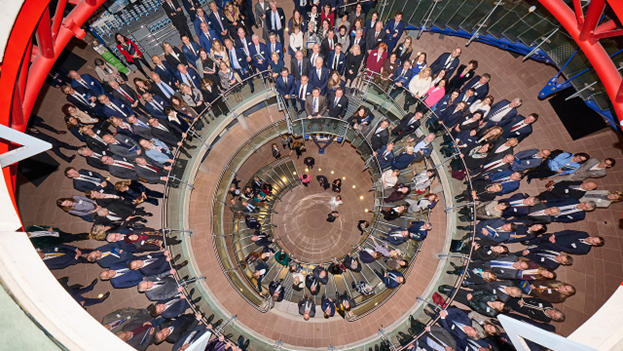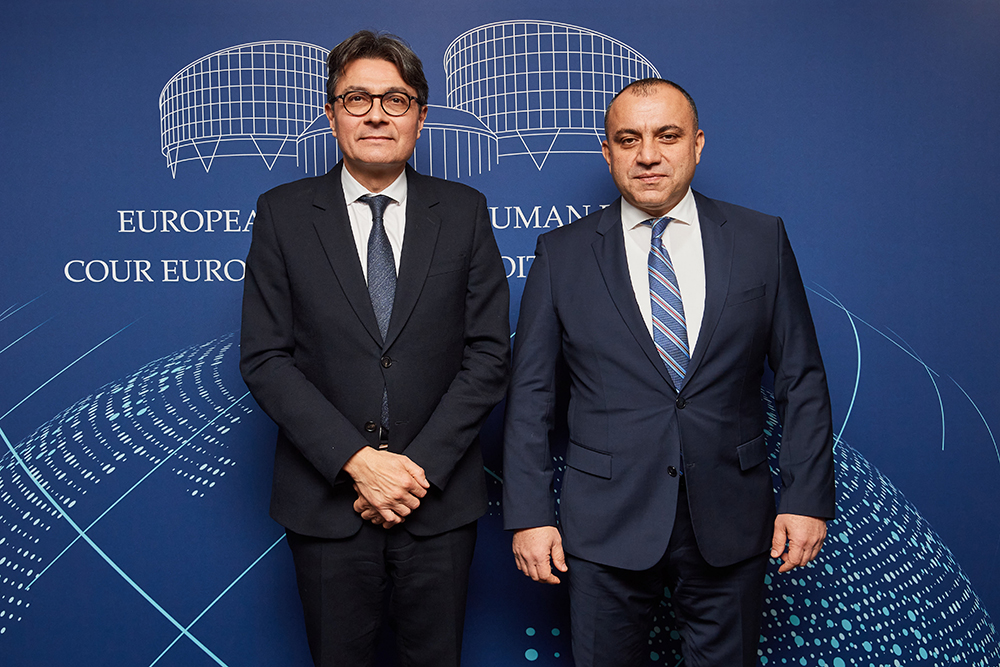
THE EVENT DEDICATED TO THE 28TH ANNIVERSARY OF THE FORMATION OF THE CONSTITUTIONAL COURT OF THE REPUBLIC OF ARMENIA TOOK PLACE AT THE CONSTITUTIONAL COURT
The official event dedicated to the 28th anniversary of the formation of the Constitutional Court of the Republic of Armenia, and the symbolic opening of the judicial year was hosted at the premises of the Constitutional Court, attended by the President of the Republic Vahagn Khachaturyan, RA Prime Minister Nikol Pashinyan, representatives of the legislative, executive and judicial powers, and diplomatic corps accredited in the Republic of Armenia.
President of the Constitutional Court Arman Dilanyan welcomed the guests and summarized in his speech the activities of the High Court in 2023. Arman Dilanyan noted that 2023 was a difficult and burdensome year, which was marked for the Constitutional Court by the visible development of precedent-setting legal positions of the Constitutional Court on the criteria for the implementation of constitutional justice.
In his speech, the President of the Constitutional Court noted that “The formation and development of constitutional culture are directly related to the establishment and strengthening of constitutional security, the rule of law state, and constitutionality in general. Constitutional culture is not only the knowledge of the Constitution, but it is also the respect for the Constitution, protecting and preserving, ensuring, and propagating the latter, as well as implementing its imperatives. This is an ongoing process inherent to the democratic state, and this process refers to transforming the law into ideology, and the ideology into the provisions of the law”.
The foundations of constitutional justice in Armenia were laid on July 5, 1995, with the adoption of the Constitution as a result of the national referendum, and this Constitution outlined a judicial system that also included the Constitutional Court. In compliance with the Constitution, on November 20, 1995, the RA National Assembly adopted the Law on the Constitutional Court, which was signed by the President of the Republic of Armenia on December 6, 1995, and served as the legal basis for the activity of the newly established constitutional authorities.
On February 5 and 6, 1996, the inaugural members of the Constitutional Court were appointed, the solemn oath ceremony was held at the National Assembly, and the High Court officially started operating on February 6, 1996.
Due to the constitutionally assigned mandate, the constitutional courts in different parts of the world, including our country, have a great role in balancing public social relations and establishing effective systems of checks and balances.
“The application and interpretation of the Constitution should not be based solely on its formal or literal content. As an integral feature of statehood, the Constitution is endowed with a number of components individualized with the given state and people, but not directly reflected in the Constitution, such as cultural, historical, moral, axiological, etc., and the so-called immunity of the Constitution, as well as its flexibility and vitality are ensured only due to the interpretation and application of the above components.
At the same time, in addition to expressing purely national ideals and ideas, the Constitution reflects the most contemporary legal achievements of humanity in the field of democracy, the rule of law, and the protection of fundamental human rights and freedoms”, noted Arman Dilanyan emphasizing that the Constitutional Court was always determined to interpret the Constitution with the awareness of this ideological integrity.
Prime Minister of the Republic of Armenia Nikol Pashinyan also congratulated the President, Justices, and the Staff of the Constitutional Court on the occasion of the 28th anniversary of the formation of the Constitutional Court.
The presentation of the updated Volume of legal positions of the Constitutional Court of the Republic of Armenia, published with the support of the United States Agency for International Development (USAID), was held in the frame of the official event dedicated to the 28th anniversary of the formation of the Constitutional Court, and the opening of the judicial year.
The Volume was compiled and updated by Alina Pkhrikyan, Advisor to the President of the Constitutional Court, Artak Ghazaryan, Assistant to the President of the Constitutional Court, and Aida Tadevosyan, Head of the Expertise-Analytic Division of the Constitutional Court. The Volume includes particularly important legal positions expressed by the Constitutional Court from almost 4,000 decisions of the Constitutional Court, including the decisions on the merits, procedural decisions, and the decisions of the panel of justices.
ach decision included in the Volume has a QR code, which allows to access to the full version of the official text of the decision.
The Volume is designed for both scholars engaged in theoretical research, and practicing legal scholars.
News

3 February 2026
THE PRESIDENT OF THE CONSTITUTIONAL COURT OF THE REPUBLIC OF ARMENIA MET WITH THE DIRECTOR OF HUMAN RIGHTS OF THE COUNCIL OF EUROPE

3 February 2026
THE PRESIDENT OF THE CONSTITUTIONAL COURT OF THE REPUBLIC OF ARMENIA MET WITH THE PRESIDENT OF THE VENICE COMMISSION

2 February 2026
THE PRESIDENT OF THE CONSTITUTIONAL COURT PARTICIPATED IN THE OPENING OF THE JUDICIAL YEAR OF THE EUROPEAN COURT OF HUMAN RIGHTS IN STRASBOURG

2 February 2026
MEETING OF THE PRESIDENT OF THE CONSTITUTIONAL COURT OF THE REPUBLIC OF ARMENIA AND THE PRESIDENT OF THE EUROPEAN COURT OF HUMAN RIGHTS IN STRASBOURG

20 January 2026
THE ROLE OF STATE AUTHORITIES AND CIVIL SOCIETY IN THE IMPLEMENTATION OF THE DECISIONS OF THE CONSTITUTIONAL COURT

The website of the Constitutional Court of the Republic of Armenia has been created as part of the Partnership for Good Governance (PGG II) Project ''Support to the judicial reform – enhancing the independence and professionalism of the judiciary in Armenia'' co-funded by the European Union and the Council of Europe. The views expressed herein can in no way be taken to reflect the official opinion of either party.

The upgrade of the official website of the Constitutional Court of the Republic of Armenia is made possible by the support of the American People through the United States Agency for International Development (USAID) as a part of the USAID/Armenia Justice Sector Support Project. The content of this website is the sole responsibility of the Constitutional Court and does not necessarily reflect the views of USAID or the United States Government.


















